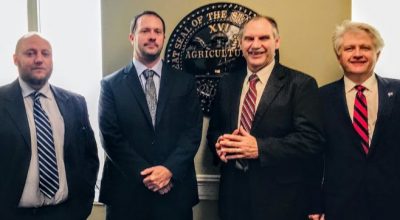
Tennessee attorney general and Gov. Bill Lee are working together to rear a legally defective program of social engineering, most recently with an AG opinion about the lawfulness of mask mandates.
By David Tulis / NoogaRadio 92.7 FM
The opinion Friday is a bottle of milk for a suckling whose strength as a governmental offspring promises to accelerate the economic ruin and social atomization of the people of Tennessee. The CV-19 child is four months old already, a colossal mistake dubbed a state and national emergency.
Herbert Slatery III’s opinion, No. 20-14, “constitutionality of governmental mandate to wear face coverings,” shares the principle defect of state policy.
It upholds as righteous and constitutional a project regarding public health that ignores in its entirety the public health statute and has covered the entirety of the state’s 42,181 square miles with bureaucratic kudzu.
The carpeting of executive orders and mandates blots out the light, and promises to grow deeper and thicker by the month with new terrors coming into view almost nightly.
Gov. Lee and his health commissioner, Dr. Lisa Searcy, have refused to “evoke” the health law at Tenn. Code Ann. § Title 68, health, safety and environmental protection. Instead, they are using the emergency statute that allows for no limits, even beyond legally approved concentration camps for the sick.
The CV-19 “response” by Gov. Lee and his Republican party is bringing Tennessee and its 6.8 million people into economic disaster and social dysfunction unlike any in state history.
Davidson County has lost about F$2.1 billion in visitor spending due to the COVID-19 pandemic through July 11 (F = federal reserve system bank scrip that passes for lawful money).
The Nashville Convention & Visitors Corp. says the city had 1,169 meeting/convention cancellations involving 908,722 room nights and 580,273 people. These events, were it not for Gov. Lee and his scorched-earth rule, would have created F$450 million in spending, F$36 million in state taxes, and F$39 million in local taxes.
What the opinion offers
Mr. Slatery’s opinion is an adventure in legal legerdermain and partisanship. It opens with serious consideration of the necessity underlying the acts that have overturned state government. “The pandemic remains ongoing and is currently surging.” Five paragraphs of urgency and crisis, followed by four graphs on the state’s “response to the COVID-10 pandemic,” then an analysis indicating that rules compelling “the general population” are constitutional under Jacobson v. Massachusetts, 197 U.S. 11, 27 (1905).
It sounds compelling to read Mr. Slatery’s discussion. Does a mask rule have a “‘real or substantial relation’ to the COVID-19 health crisis]?] In considering whether a governmental measure has a ‘real or substantial relation’ to a public health crisis, the inquiry is whether the measure is arbitrary or unreasonable.”
[A] challenge to a governmental face-cover mandate as violating the constitutional right to liberty is almost certain to be rejected by the courts. The face-cover mandate is likely to be held to be a reasonable regulation to mitigate the transmission of COVID-19 and would not constitute an unconstitutional infringement on liberty interests.
It’s not clear how Charme Allen, a district attorney in Knoxville who requested the opinion, could be satisfied with her boss’ nine pages of verbiage, especially Jesuitical caveat at the end which admits he’s not answering her question.
The constitutionality of any particular governmental mandate, though, would depend on its specific terms and the underlying authority of the governmental entity issuing it.
This question of “underlying authority” is the weak point of Mr. Slatery’s opinion. He doesn’t discuss the authority, but assumes it exists. He omits discussion of the authority because there is very, very little.
(She should know that if you ask the wrong question, you will get the right answer to the wrong question. “The Court will not pass upon a constitutional question although properly presented by the record, if there is also present some other ground upon which the case may be disposed of. This rule has found most varied application. Thus, if a case can be decided on either of two grounds, one involving a constitutional question, the other a question of statutory construction or general law, the Court will decide only the latter.” Ashwander v. Tennessee Valley Auth., 297 U.S. 288, 347, 56 S. Ct. 466, 483, 80 L. Ed. 688 (1936)
Health law? Where’s health law?
The Tennessee health law is being ignored by Messrs. Lee and Slatery because it condemns what they are doing to ostensibly slow the spread of the season’s novel flu strain.
It condemns them because —
➤ It envisions the power of Commissioner Searcy being directed upon the sick, not upon the healthy.
➤ The officials ignore the liberties of the people, whose constitution requires they be given notice, warrant and trial before any use of police or judicial power against them. The health law outlines how contumacious and noncompliant sick spreaders of disease are to be accused under warrant, tried in sessions court and confined if carrying a disease.
➤ It opens with a shocking demand: That “the commissioner shall prepare and carry into effect such rules and regulations as *** will, with the least inconvenience to commerce and travel, prevent the spread of the disease.” Gov. Lee has boldly rejected this standard, to the ruin of tens of thousands of citizens. (Tenn. Code Ann. § 68-1-201, quarantine). His asphyxiating kudzu of rules and regulations and delegated powers have put 503,888 Tennesseans on the jobs dole since mid-March.
The health law establishes the department of health, the office of Dr. Searcy and a web of regulatory bodies that control the labor pool of people ranging from optometry and osteopaths to dentists.
The provisions of interest in the CV-19 crisis are a mere few pages in a title that runs 443 pages.
Why does Lee ignore powerful concentration camp law?
The ones ignored by Mr. Slatery and Gov. Lee in their extralegal adventure include a key statute on quarantine — a law that lets the governor create concentration camps or “quarantine stations” for sick people at times of “ yellow fever, cholera, smallpox or other epidemic diseases.”
It’s a frightening power — but the state government has had this power since 1879. It’s frightening, but it’s a lawful law coalescing mighty compulsory powers within the government, powers to be applied upon citizens who refuse to self-isolate or who refuse to avoid social activities as suspected or known spreaders of disease [aka “social distancing.”)
The commissioner shall “select suitable localities for establishing quarantine stations, and may erect necessary temporary buildings for the disinfection of passengers, baggage, cargo and other matter believed to convey the contagious principle of cholera, yellow fever, smallpox and other epidemic diseases, and may enforce the transshipment of passengers as the commissioner may deem necessary.” Tenn. Code Ann. § 68-1-202. [emphasis added]
Want to bolt from a concentration camp? Watch out. An inmate who “willfully disregards or evades quarantine, or violates any rule or regulation made in attempting to prevent the spread of any epidemic disease, commits a Class B misdemeanor.” Tenn. Code Ann. § 68-1-204.
The health law directs state investigative powers out into society upon those who are reported or suspected of being sick but who are in proximity to healthy people. Healthy people are not subject to the health statute.
Health officials get word about careless spreaders of disease much as police get tips from the public about wanted criminal suspects. There is, in a health crisis, public participation — community policing, as it were, with health (not crime) being that which is surveiled.
(a)(1) It is the duty of the local health authorities, on receipt of a report of a case, or suspected case, of disease declared to be communicable, contagious, or one which has been declared by the commissioner of health to be subject to isolation or quarantine, to confirm or establish the diagnosis, to determine the source or cause of the disease and to take such steps as may be necessary to isolate or quarantine the case or premise upon which the case, cause or source may be found, as may be required by the rules and regulations of the state department of health. Tenn. Code Ann. § 68-5-104 [emphasis added]
The Lee administration perhaps holds its nose at this law, which is as old as Leviticus 13 in the Word of God. There, the priest and savant looks at the sores of the sick, and compels them to remain apart, in isolation, and to cry out when they are approached by others along the way.
The governor is using the emergency statute, with its slender language and a single trope that he uses as basis of his entire absolutist enterprise (that being the seven last words in a law, “have the force and effect of law.” From this misdirected phrase, the following statute is the basis of his administrative legislative activity that has overturned the government.
§58-2-107(a)(2). Pursuant to the authority vested in the governor under subdivision (a) (1), the governor may issue executive orders, proclamations, and rules and may amend or rescind them. Such executive orders, proclamations, and rules have the force and effect of law. [Emphasis added.]
Executive orders apply only to people in the executive branch of the government. They do not apply to the citizenry in general. It’s true for executive orders out of Washington, and out of Nashville.


